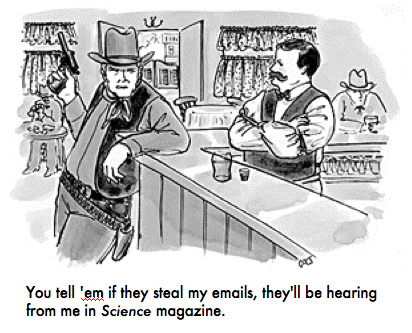#66) “Never Again” Moments: the CDC vs. the Climate Science Community (anthrax vs. Climategate)
August 29th, 2010
Catastrophic events often bring about change. For example, Hurricane Katrina in 2005 caused FEMA to clean up their act. The evidence of this was on display two years later when the catastrophic San Diego wildfires hit. FEMA did a flawless job responding, desperately trying to show they had gone through a “Never Again” moment with the mess they made out of Katrina.
Interestingly, the Centers for Disease Control in Atlanta — the world reknown CDC — actually had their own sort of “Never Again” moment, and not that long ago.
I learned this last Thursday as I spent all day as a guest at the CDC where I spoke with several groups of communicators. I also gave a talk to the entire community, filling a 250 seat hall (almost all of whom were professional communicators, not scientists!) with the overflow crowd watching a live feed in another room, plus being broadcast to several of their other locations. It was one of the most fascinating days I’ve ever had in all this communications stuff.
Here’s the first major impression I got of CDC — they have amazing communications personnel and resources. This is not an organization that sees the public as a nuisance. To the contrary, their entire mission is about the public, as in “public health.” And you can see it reflected everywhere around the 45-building campus, from their Visitors Center to their Museum to their broadcast facilities.
But it wasn’t always that way. In 2001 they received a major wake up call.
.
CAUGHT OUT BY ANTHRAX IN 2001
You may remember when 9/11 happened there was also the anthrax scare. All eyes were turned to the CDC, but guess what — they were completely unprepared for the enormity of the media attention. They didn’t even have a press conference room, much less broadcast facilities. The result was so much calamity that the next Director made it one of her top priorities with a sort of “never again” attitude.
Today they have a major broadcast studio, a press conference room, huge numbers of communications personnel and a media production team. They gave me a tour of all the facilities at the end of the day. It’s incredibly impressive — several Avid editing suites, a large high ceiling studio with several stages and permanent green screen set up. They are complete professionals when it comes to interfacing with the media and the public in general.
But still … 2001 wasn’t that long ago. Clearly they learned a great deal and implemented change.
So now let’s talk about the climate science community …
.
CLIMATEGATE: NEVER AGAIN? (again?)
Has there ever been a bigger crisis for the climate science community? Basically, no. You can maybe dig up some overturned tenure decision somewhere or re-structuring of a science organization perhaps, but there’s never been anything to compare with Climategate. In fact, has there ever been such a covert operation at such a scale conducted against any discipline within the field of science? Has anyone ever broken into the Smithsonian to steal a bunch of top secret emails about whether the sea squirt family Didemnidae should be split or lumped?
It was a powerful event. It scored enormous media coverage. Whether you believe the polls or not, you’re foolish if you don’t think it damaged the public image of the climate science community. Jon Stewart ended up laughing at the incompetence of climate scientists. It doesn’t get much worse than that these days. And it so enraged major climate scientists, they did the thing the world most fears of them … they published an angry letter in Science saying, “cut it out, you guys” (does anybody remember the old Black Bart joke — where the cowboy walks up to Black Bart and says, “Are you Black Bart, the man who stole my cattle, burned my barn, raped my wife, and killed my kids?” Black Bart nods yes. The guy says, “You better watch that shit.”).
Anyhow, I don’t see it. I don’t see the creation of a Rapid Action Communications Plan in preparation for the next time the climate skeptics pull off another totally humiliating stunt like Climategate. Hopefully, it’s happening under so much secrecy that small timers like me don’t even get to know it’s happening. I really hope so, because there’s nothing worse than hearing people say, “Never Again,” again.
